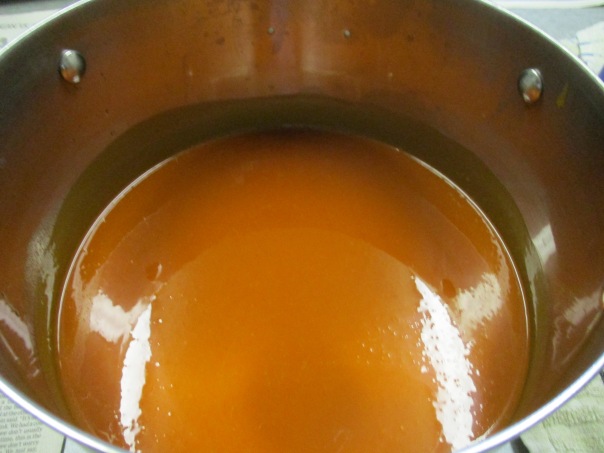I made a new soap yesterday.

When it was all mixed and ready to pour into the mold it very much resembled tomato soup. It is not something to leave unattended in the kitchen for fear that the first person who walks in would grab a bowl, ladle some in, add some crackers and be very disappointed with their lunch. Don’t Eat It!
This soap recipe has six ingredients and all but one of them are included in my diet on a regular basis, they are olive oil, coconut oil, water, yogurt and turmeric. The sixth ingredient is sodium hydroxide, also known as lye, and that is what turns oils and liquids into soap.
This soap will be ready in about six weeks, and I will be sure to let you know how it turns out. I am certain that the yogurt will give it the same bubbly, creamy lather that we have experienced with both Salad Bar and Aloe but I am very curious the see what properties turmeric brings to the table shower.
Until next time be well.
That sounds fascinating.
I did have to re-read the title after seeing the picture. I thought maybe this was going to be a post about tomato soup after all.
LikeLiked by 1 person
I had read it over several time to make sure I didn’t write soap when I meant soup and vice versa. LOL. Thankfully my husband always proof reads for me as well.
LikeLiked by 1 person
How luck for you.
LikeLike
🙂
LikeLiked by 1 person
*lucky of course, typo.
LikeLiked by 1 person
Could you use something else than lye to make soap? I have started a quest to avoid supermarkets and soap or shower gel making is one thing I am considering.
LikeLike
Good question! By definition soap is made by combining lye with fats and liquid. There are actually two different chemicals that are called lye. One is sodium hydroxide which is used to make bar soap and it is what I use in soap making. The other is potassium hydroxide which is made out of wood ash. I have not use this yet but it is my understanding that this makes a soft or liquid soap.
Commercially made shower gels or body washes are generally not soap because of the ingredients. I think of them more like a detergent.
It is quite common for people to be afraid of working with lye. There are some precautions that you need to take when using lye but it is really not as scary as it sounds.
I also think people have concerns about lye because they remember or have heard tell of great grandmas lye soap and how harsh it was but back then great grandma probably didn’t have an exact recipe and was not measuring every ingredient so the soap was probably lye heavy. Today we have tools available to formulate recipes so that the soap does not have extra lye and is not harsh on the skin.
What are your concerns about using lye? I would love to help.
LikeLike
I don’t know much about it but the danger bit is one part. The other is I would rather use as less chemicals if possible which sounds a little silly when it comes to soap making, I guess.
LikeLike
I understand wanting to use less chemicals. I do not add colorants or fragrances to my soaps. As far as chemicals go sodium hydroxide is derived from rock salt and potassium hydroxide from wood ash so in my mind they are probably more natural than most ingredients in commercial body washes.
LikeLike
That makes sense. I think I need to read up more before I venture into it. Will follow your posts and learn more 😊
LikeLiked by 1 person
Turmeric, great idea. Not making any health claims but I wonder if it might sooth my rosacea. Can’t wait to try it ❣
LikeLike
I will let you know when it’s ready. It’s worth a try. 🙂
LikeLike
I think it looks like caramel.
LikeLiked by 1 person
Just Don’t Eat It! LOL
LikeLiked by 1 person
Isn’t turmeric supposed to be good for making skin tone more even and lessening scars? It would be nice as a soap ingredient instead of in a scrub or masque form.
LikeLiked by 1 person
I have read that, but I really can’t say what might happen after it is processed with the lye. Nor am I allowed to advertise my soaps as doing anything other than being a soap. I do know that turmeric is good for many things so why not soap? Thanks for reading.
LikeLiked by 1 person
Would love to learn to make soap . . and cheese!!
LikeLiked by 1 person
Soap making is fun and addicting. I have made mozzarella cheese one time but since I don’t have milk animals I haven’t done anymore. If and when God sees fit for me to have goats I will probably learn cheese making. Thanks for reading.
LikeLiked by 1 person